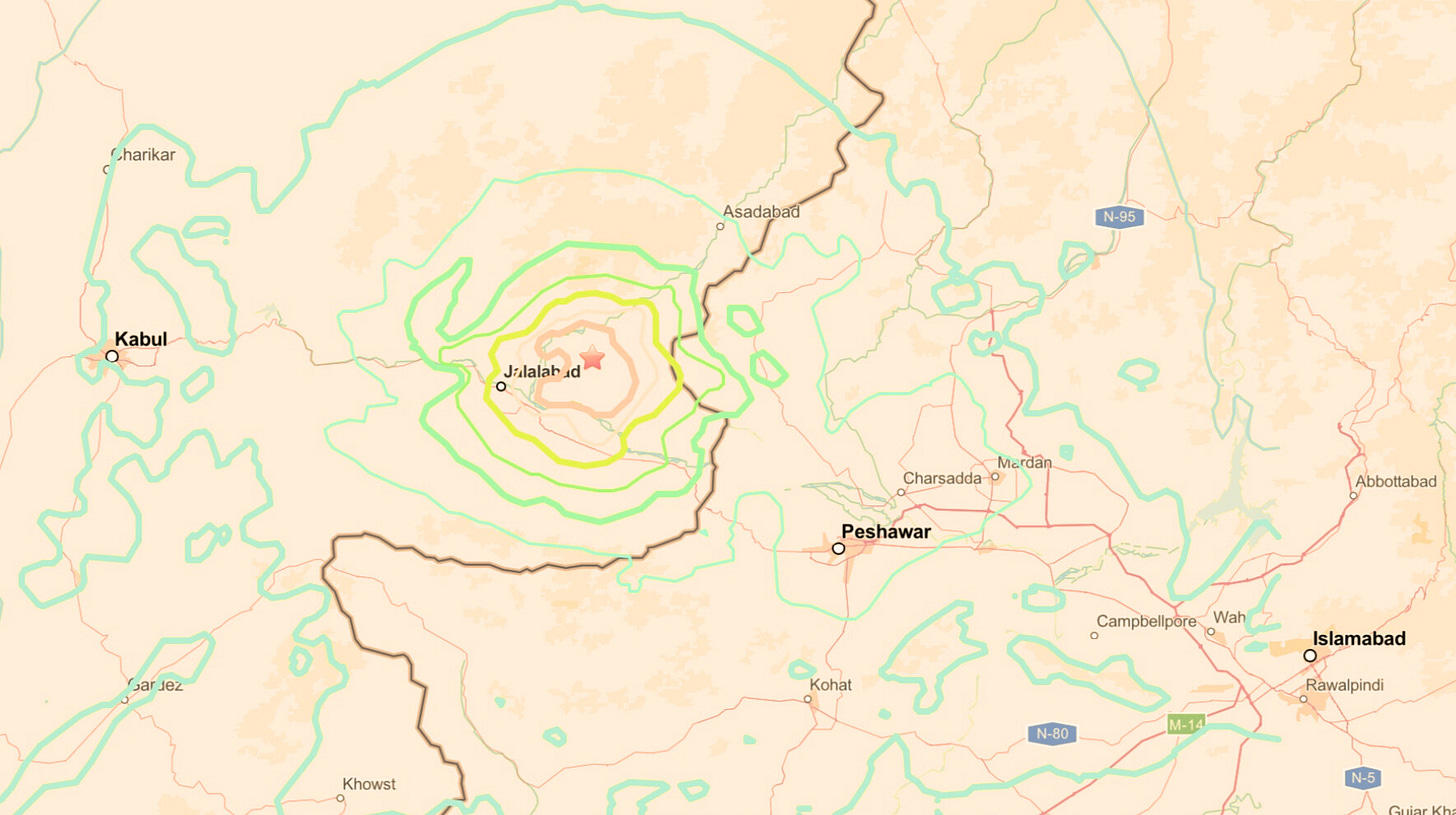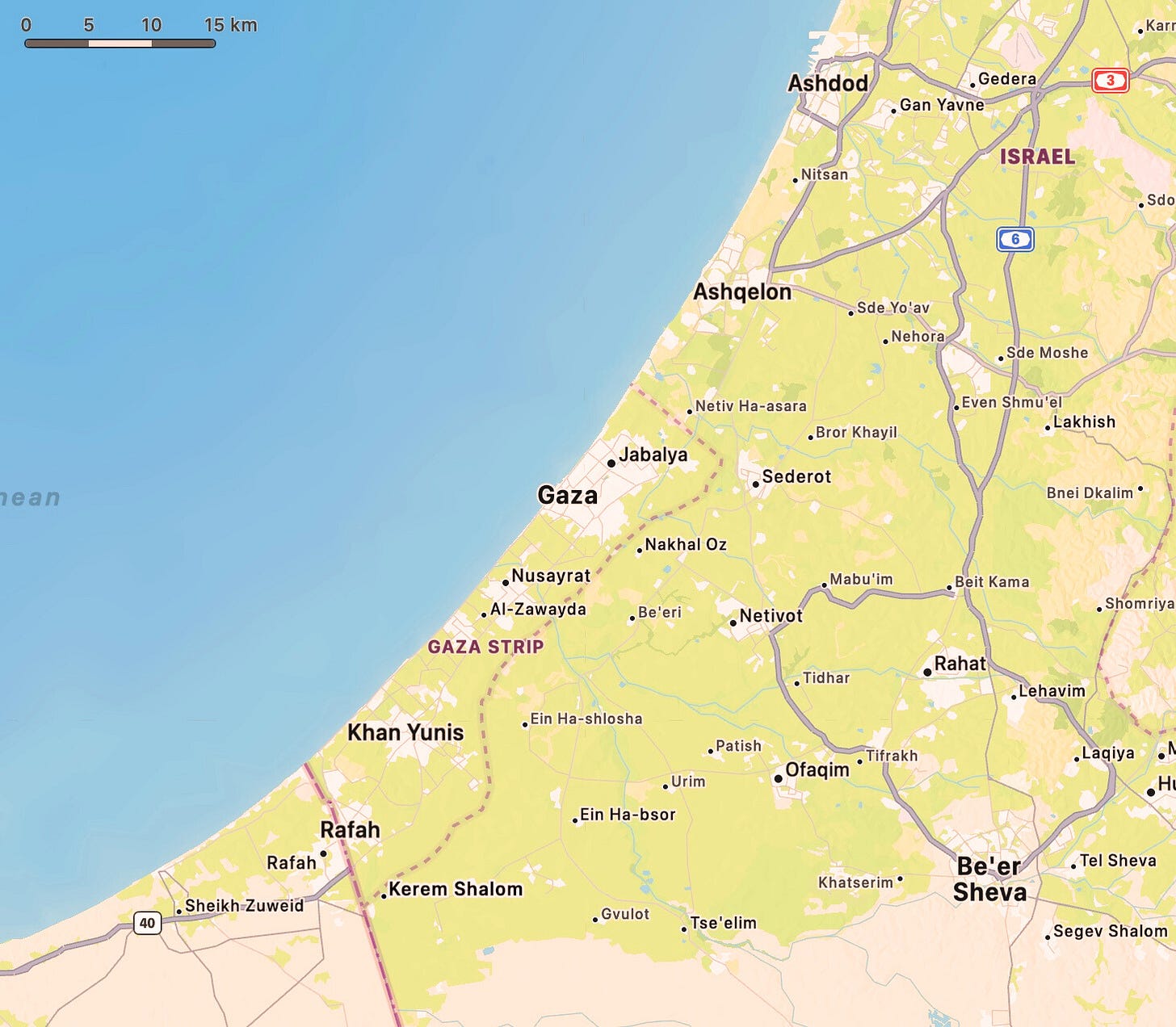10 Things Global News - 1st September 2025
The news from around the world
Deadly Quake Hits Eastern Afghanistan
Merz Warns Ukraine War May Be Prolonged
Houthis Raid UN Offices, Detain Staff in Yemen
Xi Urges SCO to Reject Cold War Mentality
Xi and Modi Pledge Partnership at Summit
Israel Claims Killing Hamas Spokesman in Gaza
US Plan Would Administer Gaza for a Decade
Appeals Court Rules Most Trump Tariffs Illegal
Europe Drafts Plans for Troop Deployment to Ukraine
Flotilla Departs Barcelona to Challenge Gaza Blockade
A powerful earthquake struck eastern Afghanistan late Sunday, killing at least 250 people and injuring hundreds more, according to authorities. The 6.0 magnitude tremor hit Kunar province near the Pakistan border at about 11:47pm local time, the US Geological Survey reported, at a shallow depth of just 8km. Entire villages were badly damaged, with the hardest-hit areas including Nur Gul, Soki, Watpur, Manogi and Chapadare districts.
Officials warned the toll is likely to rise as rescue teams struggle to reach remote mountain villages cut off by landslides. Hundreds of injured have been taken to hospitals in Jalalabad and surrounding areas, while aftershocks have continued into Monday morning. The quake was felt across eastern Afghanistan and as far as Pakistan’s Punjab province, where residents reported being jolted awake.
Emergency teams are being deployed from Kabul, with authorities pledging to use all available resources to aid survivors and support displaced families.
Sources: Al Jazeera, The Guardian
German Chancellor Friedrich Merz said he is preparing for the possibility that the war in Ukraine could drag on for years, while rejecting any suggestion that Kyiv should capitulate. In a televised interview on Sunday, Merz stressed that diplomacy is a lengthy process, not a quick fix, and cautioned against expectations of a near-term ceasefire.
He underlined that Ukraine’s independence must be preserved, warning that surrender would invite further aggression across Europe. Merz reiterated that Germany’s top priority remains supporting Ukraine’s military so it can defend itself in the long term.
Reflecting on June’s NATO summit in The Hague, he said Germany’s decision to loosen debt rules and boost defense spending to 3.5 percent of GDP, with an additional 1.5 percent for infrastructure, was pivotal in preventing the alliance from fracturing. Despite record defense budgets, troop numbers have stagnated at about 182,000, underscoring recruitment challenges.
Sources: Politico Europe, Bloomberg
Yemen’s Houthi rebels raided United Nations offices in Sanaa on Sunday, detaining at least 11 UN staff in the capital and in the port city of Hodeidah. The United Nations envoy to Yemen, Hans Grundberg, condemned the arrests, calling them arbitrary and demanding the immediate release of all personnel. He said the Houthis also forcibly entered World Food Programme premises and seized UN property.
The detentions come after Israeli strikes last Thursday killed Ahmed Ghaleb Nasser al-Rahawi, the Houthi prime minister, and several ministers in Sanaa. Houthi authorities had recently accused aid workers of spying, allegations strongly rejected by the UN. Before Sunday’s raids, 23 UN employees were already being held, some since 2021, and one died in detention this year.
The United Nations has previously scaled back operations in Yemen, where a decade-long civil war has left over half the population dependent on aid.
Sources: Reuters, Times of Israel
Chinese President Xi Jinping urged regional leaders to oppose a “Cold War mentality” at the Shanghai Cooperation Organisation summit in Tianjin, saying members face increasingly complicated security and development challenges. He called for “equal and orderly multipolarisation” and a “more just and equitable” global governance system, and urged the bloc to deepen trade and investment facilitation.
Xi pledged 2 billion yuan ($280 million) in aid to member states this year and 10 billion yuan ($1.4 billion) in loans to an SCO banking consortium. More than 20 leaders, including Russia’s Vladimir Putin, India’s Narendra Modi, Iran’s Masoud Pezeshkian, and Belarus’s Alexander Lukashenko, are attending the two-day gathering.
The summit — which Beijing promotes as an alternative to Western-led groupings — coincides with broader efforts by China to showcase its global influence, including plans for a military parade in Beijing marking the 80th anniversary of the end of World War II.
Sources: New York Times, Al Jazeera
Chinese President Xi Jinping and Indian Prime Minister Narendra Modi met in Tianjin on Sunday, pledging to treat each other as partners rather than rivals after years of strained ties. It was Modi’s first visit to China in seven years, and he announced that direct flights between the two countries, suspended since deadly border clashes in 2020, would resume. Xi said the two nations should deepen mutual trust and approach relations from a long-term perspective.
The meeting took place on the sidelines of the Shanghai Cooperation Organisation summit, attended by more than 20 world leaders including Russian President Vladimir Putin. The summit has been overshadowed by escalating trade disputes with the United States, which recently doubled tariffs on Indian goods to 50 percent in response to Delhi’s continued purchases of Russian oil.
Leaders are expected to sign agreements strengthening security, economic and cultural cooperation, while also commemorating the 80th anniversary of the end of World War II.
Sources: Time, BBC, South China Morning Post
Israel says it killed Abu Obaida, the longtime spokesman for Hamas’s armed wing, in an airstrike on Gaza City on Saturday. Abu Obaida, whose real name was Hudhayfa al-Kahlout, had been the face of the Izzedine al-Qassam Brigades for nearly two decades, overseeing propaganda and hostage videos. Israeli officials described the strike as a symbolic blow, though Hamas has not confirmed his death.
The attack came as Israeli forces pressed a new offensive in Gaza City, which has been declared a combat zone. Local hospitals reported dozens of Palestinian deaths over the weekend, including civilians trying to reach aid. Witnesses said Israeli troops opened fire on crowds in the Netzarim Corridor, calling it a “death trap.”
The conflict has already killed more than 63,000 Palestinians, according to Gaza health authorities. Aid agencies warn famine is deepening, with the U.N. saying food deliveries remain far below what is needed.
Sources: Washington Post, CBS News
A post-war proposal circulating within the U.S. administration would place Gaza under U.S. administration for at least a decade, with the enclave rebuilt as a tourism and manufacturing hub. A 38-page prospectus outlines at least temporary relocation of more than two million residents via “voluntary” departures abroad or movement into restricted zones during reconstruction.
Property owners would receive a digital token for redevelopment rights. Individuals who depart would be offered $5,000 in cash plus rent subsidies for four years and a year of food. The plan, dubbed the GREAT Trust and linked to a U.S.-backed aid group operating in Gaza, says it would coordinate with security contractors and rely on investment rather than donations.
Operations around Gaza City have intensified, with the area designated a dangerous combat zone. Aid officials warn access could tighten further as hunger indicators show severe conditions for hundreds of thousands of people.
Sources: Reuters, Washington Post
A federal appeals court ruled that most of President Donald Trump’s global tariffs are illegal, holding in a 7–4 decision that the statute he invoked does not grant authority to impose such levies and that tariffs are a core congressional power. The court paused its ruling until October 14 to allow the administration to seek Supreme Court review; the White House said the tariffs remain in effect pending appeal, and Trump called the court “highly partisan.”
The case, V.O.S. Selections v. Trump, consolidated suits by states and small businesses and follows a May ruling by the Court of International Trade that struck down the IEEPA-based tariffs. The appeals panel said the “reciprocal” and “trafficking” tariffs are unbounded in scope, amount and duration, reaching nearly all imports and many countries. Four judges dissented. Separate tariffs on steel, aluminium and copper imposed under different authority are unaffected by the decision.
Sources: CNBC, BBC
European leaders are preparing “pretty precise plans” for a multinational military deployment to Ukraine once a peace agreement is reached, according to European Commission President Ursula von der Leyen. She said the arrangements, backed by U.S. capabilities, include a clear road map for security guarantees and were confirmed during recent talks in Washington with President Donald Trump, Ukrainian President Volodymyr Zelenskyy, and senior European leaders.
The proposed deployments could involve tens of thousands of European-led troops, supported by U.S. command, intelligence, and surveillance systems. Leaders including German Chancellor Friedrich Merz, UK Prime Minister Keir Starmer, NATO Secretary-General Mark Rutte, and von der Leyen are expected to meet in Paris on Thursday at the invitation of French President Emmanuel Macron to continue discussions.
Von der Leyen said capitals are moving quickly, reflecting a sense of urgency. Any deployment would complement a significantly strengthened Ukrainian army, while EU funding would provide sustainable financing and training for Kyiv’s armed forces after a peace deal.
Sources: FT, Reuters
A flotilla of 20 ships left Barcelona on Sunday carrying activists and humanitarian aid in the largest attempt yet to break Israel’s 18-year blockade of Gaza. Organizers say the Global Sumud Flotilla, with participants from 44 countries, seeks to establish a humanitarian sea corridor to deliver food, water, and medicine.
The convoy includes high-profile figures such as Swedish activist Greta Thunberg, Irish actor Liam Cunningham, and former Barcelona mayor Ada Colau. They are joined by political and cultural figures from Spain, Portugal, and other European nations. Organizers expect as many as 70 vessels to participate in the final leg of the journey, aiming to reach Gaza around September 14 or 15.
Supporters staged large send-off rallies in Barcelona and Genoa, where additional ships loaded with 300 tonnes of aid will join the expedition. Israel has previously intercepted similar flotillas, raising uncertainty about whether this mission will succeed.















